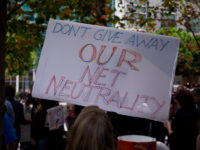Last week I delivered the CIGI Global Forum lecture in Ottawa on NAFTA and the Digital Environment. The lecture draws on some of my work for CIGI (NAFTA, Innovation) and makes the case that NAFTA negotiations are a problematic place for digital copyright reform, noting the lack of transparency, lost flexibility, and inability to strike a critical policy balance. Given that the issues are seemingly unavoidable in NAFTA, the lecture then highlights the preferred approach (relying on international treaty standards) and identifies many of the most important issues up for discussion including copyright term, fair dealing, intermediary liability and digital issues such as net neutrality and data localization. A video of the talk is embedded below.
Archive for November, 2017
Why Abandoning Net Neutrality in the U.S. Matters in Canada
Earlier this week I appeared on CBC’s On the Money to discuss the U.S. decision to abandon net neutrality and its implications for Canada. I’ve written about these issues in columns and posts, but this interview provided the opportunity to highlight the implications for Canadian business and consumers, the prospect of including net neutrality in future Telecommunications Act reforms, the connection to NAFTA, and the ongoing concerns with telecom competitiveness in Canada. The interview is embedded below.
Net Neutrality Divide: Canada and the U.S. Go Separate Ways on an Open Internet
This week’s announcement that the U.S. telecommunications regulator plans to roll back net-neutrality regulations sparked an immediate backlash from those who fear that the decision will turn the Internet into a cable-like service dominated by the carriers and deep-pocketed giants that can afford to pay new fees to keep their content on the fast lane.
My Globe and Mail op-ed notes that the U.S. order, which would also block states from carrying out their own versions of policies that stop telecom carriers from leveraging their gatekeeper status by treating similar content or applications differently, is set for a vote next month.
Music Canada Data Confirms Huge Increase in Streaming Revenues and Sharp Decline of Music Listening from Pirated Sources
Music Canada released a report on the so-called Value Gap last month which serves as the basis for its lobbying campaign for copyright reform in Canada. The industry lobby group has used the value gap rhetoric primarily as an argument to undo safe harbours for Internet intermediaries. As I noted earlier this year, the argument is poor fit in Canada. First, Canada has experienced massive growth of Internet streaming revenues, with the Canadian music market outpacing global competitors by almost any metric and revenues going to both the industry and creators.
Yesterday I posted on SOCAN generating a 10X increase in Internet streaming revenues with growth rates of over 100 per cent over the past year for songwriters, composers, and music publishers. The industry numbers from Music Canada and IFPI tell a similar story. According to industry data, the Canadian music market is growing much faster than the world average (12.8 per cent in 2016 vs. 5.9 per cent globally), streaming revenues more than doubled last year to US$127.9 million (up from US$49.82 million) growing far faster than the world average of 60.4 per cent, the Canadian digital share of revenues of 63 per cent is far above the global average of 50 per cent, and Canada has leaped past Australia to become the 6th largest music market in the world. In fact, as the chart below indicates, the growth of streaming revenues in Canada since the 2012 copyright reforms has increased significantly year-after-year with growth rates for the industry and collectives mirroring each other.
SOCAN Financial Data Highlights How Internet Music Streaming is Paying Off for Creators
Music industry lobby groups may frequently seek to equate the Internet with lost revenues, but an examination of financial data from one of Canada’s largest music copyright collectives demonstrates massive growth in earnings arising from Internet streaming including major services such as Youtube and Apple Music. While many collectives do not publicly disclose their revenues, SOCAN, which represents composers, songwriters, and music publishers, provides a detailed breakdown of revenues and distributions in its annual report.



![Santeri Viinamäki [CC BY-SA 4.0 (https://creativecommons.org/licenses/by-sa/4.0)], via Wikimedia Commons](https://www.michaelgeist.ca/wp-content/uploads/2017/11/Piracy_music_CD-200x150.jpg)







